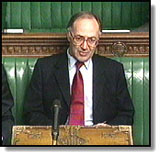
|
The 1997 Conservative Leadership Contest
The day after Labour's landslide election victory John Major told the crowds outside Downing Street that he was to stand down as leader of the Conservative Party. He had been Tory leader and Prime Minister since November 1990. His decision was widely expected given the scale of the Conservatives' defeat, although many thought that he would delay his announcement until the party had had time to re-group. Kenneth Clarke, the former Chancellor, wasted no time in announcing his candidacy. At lunchtime on the day after the election, he told the BBC's World At One Programme: "I certainly intend to be a candidate in the leadership election." The former Deputy Prime Minister, Michael Heseltine, was admitted to Hospital on Saturday May 3rd suffering from heart problems. Central Office announced that he would not be standing for the leadership. The former Social Security Secretary, right-winger Peter Lilley, appeared on On The Record on the following Sunday to announce his decision to stand.
Gillian Shephard, who many thought might stand, came out in support of Peter Lilley. Stephen Dorrell, the former Health Secretary, announced that he would also stand. These were the six candidates who contested the first ballot on June 10th. Michael Howard's challenge had not got off to the best of starts after William Hague's decision to desert him - worse was to follow. The former Prisons Minister, Ann Widdecombe, went public with a series of criticisms of her former boss over the way he had handled the dismissal of the former Head of the Prison Sevice, Derek Lewis.
Ms Widdecombe did little for Mr Howard's public image when she said that he had "something of the night" in his personality. She announced her intention to make a Commons statement about the affair. It seemed that she was determined to ensure that his leadership bid failed. Ms Widdecombe attacked Howard in the press and in the Commons chamber. Mr Howard refuted her allegations that some of his statements about the affair were "not sustainable", but it seemed that significant damage had been done to his campaign. On June 4 Stephen Dorrell decided to pull out of the contest and lend his support to the other left-wing challenger, Kenneth Clarke. Dorrell was an outsider and never looked like securing more than seven or eight votes so his decision was widely expected. He may well have been humiliated had he stood in the first ballot.
|
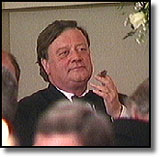
|
| Kenneth Clarke: Won the first round |
No candidate was expected to poll the 83 votes required to win outright in the first ballot and this was reflected in the result. Kenneth Clarke came top with 49 votes, Hague was next with 41, Redwood surprised the pundits by coming third with 27. Peter Lilley polled 24 votes, ahead of Michael Howard who came last with 23.
John Redwood was delighted with his performance and immediately urged Howard and Lilley to join his team. Both men refused and instead offered their support to the new favourite William Hague.
Round Two
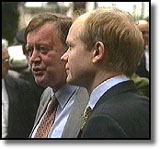
|
| Clarke and Hague left to fight it out |
Both his rivals accused Hague of changing his stance and of, at just 36, being too young for the job. Hague insisted that he would not respond to personal criticisms. He went in to the second round as the favourite but again was not expected to poll well enough to win the contest at the second round stage. The contest was now billed as a head-to-head between Clarke and Hague. Clarke had made it clear by now that, if defeated, he would not serve in a shadow cabinet led by either rival.
In the event, Clarke came out on top for a second time with 64 votes to Hague's 62. John Redwood polled 38 votes and was therefore eliminated.
Round Three
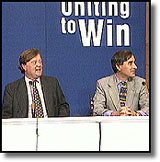
|
| An "Unholy Alliance"? |
|
|
| Redwood declares for Clarke |
If a reasonable number of Redwood followers had followed their man's lead then Clarke would have gone close to winning. One high-profile Conservative who had so far remained quiet decided it was time for action. Baroness Thatcher could not bear the thought of Kenneth Clarke winning the contest and declared her support for William Hague. The eventual result showed that John Redwood's endorsement of Kenneth Clarke was miscalculated. Redwood supporters obviously did not approve and Hague won, by what was in these terms, a large margin of 22 votes.
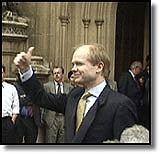
|
William Jefferson Hague became the youngest Tory leader since William Pitt became Prime Minister in 1783 at the age of 25. If Hague were elected Prime Minister in 2002, he would become the second youngest ever prime minister. Tony Blair, at 44, is currently the second youngest PM.
Diana, Princess of Wales, 1961-1997
Conference 97
Devolution
The Archive
News |
Issues |
Background |
Parties |
Analysis |
TV/Radio/Web
Interactive |
Forum |
Live |
About This Site
News |
Issues |
Background |
Parties |
Analysis |
TV/Radio/Web
Interactive |
Forum |
Live |
About This Site
© BBC 1997 |
politics97@bbc.co.uk |

